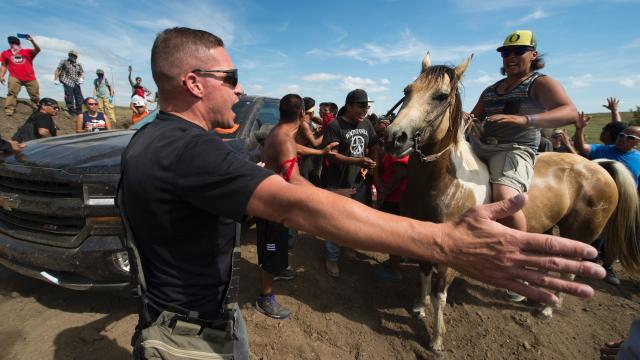Despite the U.S. Constitution granting us the right to peaceful assembly, many U.S. states have been pushing forth laws to make that a crime. That’s not only a bad idea but an incredibly dangerous one.
Legal experts note that these bills and laws”which 38 states have considered and 21 have passed“threaten democracy at large by scaring the public into silence on key issues like climate change. What’s more, state legislators in Kentucky, South Dakota, and West Virginia have stealthily passed anti-protest laws during the courts recently ruled the pipeline’s approval didn’t meet federal environmental standards), but many did manage to rack up criminal charges for their direct actions. Some protestors even face 110 years in prison. And this was all before the passage of any anti-protest laws.
“The reality is that there are already many laws on the books that address the concerns that these bills are purportedly addressing from trespass to property damage,” Eidelman said. “The problem in the realm of protest, if anything, is that there are already too many tools in law enforcement’s toolkit to go after and silence protestors.” “¨
That’s the thing about these news laws. It is not as though laws don’t already exist to punish those who trespass or damage private infrastructure. This new wave of laws, however, targets protestors in an unprecedented manner. Some go as far as to wrongly frame protestors as terrorists by deeming their actions “economic terrorism,” as is the case in a bill that didn’t survive in North Carolina, or “domestic terrorism,” in a similarly defeated bill in Georgia.
“The problem, at the end of the day, is [these laws are] unnecessary, they’re extreme, and they’re vague,” Nicholas Robinson, the legal adviser for the U.S. program at the International Centre for Not-for-Profit Law, told Earther.
South Dakota has been trying to pass anti-protest legislation for more than a year. The ACLU won a legal case against Governor Kristi Noem’s first round of bills. That didn’t stop Noem from trying again: The governor passed another pair of bills meant to criminalise protests.
South Dakota’s new laws protect so-called “critical infrastructure,” which it defines as essentially any piece of fossil fuel infrastructure. Trespassing is only a misdemeanour, but causing “substantial interruption or impairment,” which is broadly defined, is a Class 6 felony. That means up to two years of prison and a $US4,000 ($6,286) fine.
These new South Dakota laws also criminalise protests by conflating them with violent riots. One law categories “any intentional use of force or violence by three or more persons” as a Class 4 felony offence, punishable with up to 10 years of imprisonment and $US30,000 ($47,148) in fines. While the law fails to properly define what counts as “force” or “violence,” it notes that “persons” may include nonprofits. That type of targeting may keep environmental organisations from supporting local protests efforts because an action needs only three bad actors for the state to target partner organisations.
The laws have been passed at a critical time for activists in the state who have been organising around stopping the Keystone XL Pipeline. Construction is set to start this month. And while the state welcomes construction crews during this health crisis, activists won’t be able to gather in protest until the covid-19 pandemic passes. Once it does, opponents will face a new threat: prison.
“You also have many of these bills that have collective liability provisions, so if an organisation or organiser who organises a protest could potentially be considered part of a criminal conspiracy if one person at the demonstration then trespasses,” Robinson said.
This is but one example among a myriad of state bills and laws. Their language is often very broad, which makes them susceptible to abuse or misinterpretation by authorities, Robinson said. Plus, they’re corporate-backed. Many bills pull direct language from a draft bill the evil-arse American Legislative Exchange Council”a group that creates plug and play bills to advance a conservative agenda that favours big business”dreamed up in 2017. So not only do these bills ignore the Constitution, they also serve conservative industry interests instead of the constituents whose interests these officials were elected to support.
“Rather than listen to voices of dissent and listen to the voices of their constituents, legislators are choosing to silence those voices, to make people fearful to speak out on issues of incredible public concern including environmental rights, including racial justice,” Eidelman of the ACLU said. “That’s the opposite of what should be happening.”
People protest and risk arrest to stop the construction of oil pipelines to voice their concerns and push leaders to do more to protect their public health, environment, and future generations. As the climate crisis grows more severe, we need to hear these voices now more than ever.
